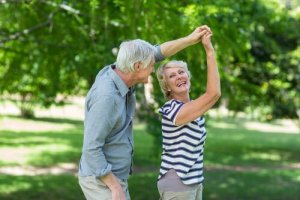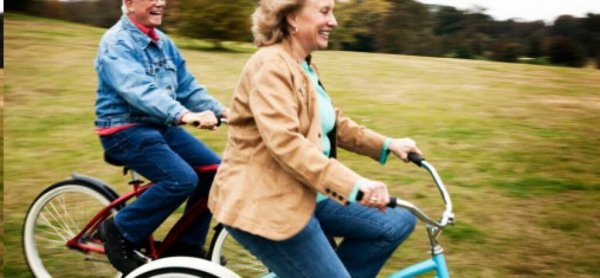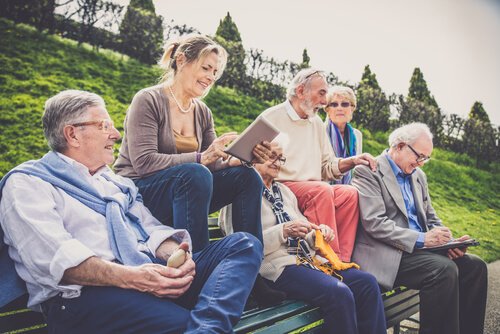7 Keys to Healthy Aging


Written and verified by the psychologist Sergio De Dios González
Statistics show more people nowadays are reaching the age of 100 or older. This means that it’s important to ask ourselves the following question: what can we do to avoid health problems as we get older? In short, what are the keys to healthy aging?
There are different factors that help answer this question: our genes, our habits, and our social environments.
7 keys to healthy aging
Nowadays, we’re living a lot longer than our ancestors did. According to the World Health Organization (WHO), our life expectancy is increasing. This is due to our personal habits, living conditions, and medical and pharmacological advances.

The importance of genetics
Having good genes is a decisive factor when it comes to disease resistance. A family history of disease plays a big role. If your family has no history of hereditary diseases and your ancestors lived long and healthy lives, genetics will probably be on your side.
A good genetic history increases the possibility of a longer life, better bone structure, smoother skin, and even greater control of our emotions. This emotional control can influence our behavior in a positive way.
Not everyone ages at the same speed
Biological age doesn’t always coincide with chronological age. For example, if you were to go to a college alumni reunion, some people, although they’re the same age, will look much older or younger than others. Time is sometimes kinder to some more than others.
Aging is a personal experience that’s influenced by external and internal factors. These factors condition our way of life and will decide how gracefully we move into old age. The result of these factors is often noticeable in our physical appearance, as well as our emotional state.
Healthy nutrition and other nutritional needs
A healthy and balanced diet is important throughout our lives, but especially as we age. Unless a doctor prohibits any food, it’s recommendable to eat a variety of foods, such as plenty of fresh fruits and vegetables, carbohydrates (cereals, bread, pasta, or rice), dairy products, and fish. It’s a good idea to avoid fats, sweets, and mass-produced foods.

Exercise: Get up and move!
It’s never too late to start exercising. Exercise is important to avoiding a sedentary lifestyle. The three pillars of physical health are strength, flexibility, and balance. By working on them, we increase our chances of healthy aging.
Walking, dancing, or practicing a specific sport helps us maintain an appropriate body weight. It also reduces the risk of diseases such as diabetes or hypertension. In addition, it strengthens self-esteem and increases the sense of personal well-being.
Hygiene and physical appearance
Adequate personal hygiene is crucial to healthy aging. Proper hygiene habits and hydration are very important. Showering daily, brushing your hair, brushing your teeth, and the appearance of our clothes greatly affect our self-image and how others view us.
Taking care of yourself and your physical appearance is important. It increases self-esteem and reinforces the idea that you should care for your body in every way. Don’t forget that your appearance is the first thing you show about yourself to others!
Social life: Get out of the house!
Retirement, children moving out, or the death of friends and family members can lead to a lot of loneliness in elderly people. This is why it’s important to avoid social isolation as we age.
Staying active, signing up for workshops or classes, or joining groups or going to meetings helps create a feeling of connectedness and well-being. It also improves self-esteem and the chances of healthy aging.

Mental activities
Number games, crosswords, and memory tests are simple ways to exercise the brain. These types of activities or similar ones can help our brains stay sharp as we age. Getting older doesn’t mean we have to stop learning. Engaging in intellectual activities can keep our minds strong until we reach very old age.
It’s important to exercise the brain as if it were a muscle. Keeping our cognitive abilities in good shape is a significant factor in healthy aging.
“Old age is like climbing a mountain. You climb from ledge to ledge. The higher you get, the more tired and breathless you become, but your views become more extensive.”
-Ingmar Bergman-
Statistics show more people nowadays are reaching the age of 100 or older. This means that it’s important to ask ourselves the following question: what can we do to avoid health problems as we get older? In short, what are the keys to healthy aging?
There are different factors that help answer this question: our genes, our habits, and our social environments.
7 keys to healthy aging
Nowadays, we’re living a lot longer than our ancestors did. According to the World Health Organization (WHO), our life expectancy is increasing. This is due to our personal habits, living conditions, and medical and pharmacological advances.

The importance of genetics
Having good genes is a decisive factor when it comes to disease resistance. A family history of disease plays a big role. If your family has no history of hereditary diseases and your ancestors lived long and healthy lives, genetics will probably be on your side.
A good genetic history increases the possibility of a longer life, better bone structure, smoother skin, and even greater control of our emotions. This emotional control can influence our behavior in a positive way.
Not everyone ages at the same speed
Biological age doesn’t always coincide with chronological age. For example, if you were to go to a college alumni reunion, some people, although they’re the same age, will look much older or younger than others. Time is sometimes kinder to some more than others.
Aging is a personal experience that’s influenced by external and internal factors. These factors condition our way of life and will decide how gracefully we move into old age. The result of these factors is often noticeable in our physical appearance, as well as our emotional state.
Healthy nutrition and other nutritional needs
A healthy and balanced diet is important throughout our lives, but especially as we age. Unless a doctor prohibits any food, it’s recommendable to eat a variety of foods, such as plenty of fresh fruits and vegetables, carbohydrates (cereals, bread, pasta, or rice), dairy products, and fish. It’s a good idea to avoid fats, sweets, and mass-produced foods.

Exercise: Get up and move!
It’s never too late to start exercising. Exercise is important to avoiding a sedentary lifestyle. The three pillars of physical health are strength, flexibility, and balance. By working on them, we increase our chances of healthy aging.
Walking, dancing, or practicing a specific sport helps us maintain an appropriate body weight. It also reduces the risk of diseases such as diabetes or hypertension. In addition, it strengthens self-esteem and increases the sense of personal well-being.
Hygiene and physical appearance
Adequate personal hygiene is crucial to healthy aging. Proper hygiene habits and hydration are very important. Showering daily, brushing your hair, brushing your teeth, and the appearance of our clothes greatly affect our self-image and how others view us.
Taking care of yourself and your physical appearance is important. It increases self-esteem and reinforces the idea that you should care for your body in every way. Don’t forget that your appearance is the first thing you show about yourself to others!
Social life: Get out of the house!
Retirement, children moving out, or the death of friends and family members can lead to a lot of loneliness in elderly people. This is why it’s important to avoid social isolation as we age.
Staying active, signing up for workshops or classes, or joining groups or going to meetings helps create a feeling of connectedness and well-being. It also improves self-esteem and the chances of healthy aging.

Mental activities
Number games, crosswords, and memory tests are simple ways to exercise the brain. These types of activities or similar ones can help our brains stay sharp as we age. Getting older doesn’t mean we have to stop learning. Engaging in intellectual activities can keep our minds strong until we reach very old age.
It’s important to exercise the brain as if it were a muscle. Keeping our cognitive abilities in good shape is a significant factor in healthy aging.
“Old age is like climbing a mountain. You climb from ledge to ledge. The higher you get, the more tired and breathless you become, but your views become more extensive.”
-Ingmar Bergman-
This text is provided for informational purposes only and does not replace consultation with a professional. If in doubt, consult your specialist.







